At the time of my writing this there is no official word from Rome yet, but strong rumours started to surface yesterday that Rome has issued a decision in favour of the seven German bishops who had serious doubts about the proposed pastoral guide concerning Communion for non-Catholics, that the German Bishops’ Conference had voted for in February. The Congregation for the Doctrine of the Faith, the rumours say, has studied the matter and the final decision is explicitly endorsed by the Holy Father. The official statement may become public, but it appears that the question was deemed important enough to lead to an unusual swift decision, made all the more significant by papal involvement.
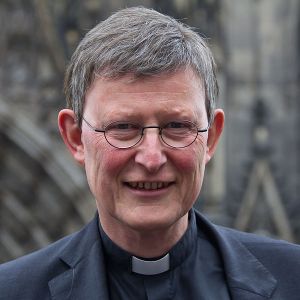 While the letter by Cardinal Woelki, Archbishop Schick and Bishops Zdarsa, Hanke, Ipolt, Voderholzer and Oster received much attention in the media, the signatories themselves treated it as a normal matter of correspondence. Cardinal Woelki, who was visiting Ukraine when the news broke, expressed his surprise at the hype and the talk about dissent. Presenting the questions about intercommunion to Rome was not so much a matter of going against his fellow bishops, but rather came from the importance of the matter: “With several bishops, we were convinced that it would be good to universally coordinate the solution that we have discussed and established here, with an eye on the unity of the Church and the common ground with the other particular churches.” Cardinal Woelki is not so much opposed to the proposals from the conference, to allow non-Catholic spouses of Catholics to receive Communion with their partner on a case-by-case basis, but does not think it is a decision that should be made by the German bishops alone.
While the letter by Cardinal Woelki, Archbishop Schick and Bishops Zdarsa, Hanke, Ipolt, Voderholzer and Oster received much attention in the media, the signatories themselves treated it as a normal matter of correspondence. Cardinal Woelki, who was visiting Ukraine when the news broke, expressed his surprise at the hype and the talk about dissent. Presenting the questions about intercommunion to Rome was not so much a matter of going against his fellow bishops, but rather came from the importance of the matter: “With several bishops, we were convinced that it would be good to universally coordinate the solution that we have discussed and established here, with an eye on the unity of the Church and the common ground with the other particular churches.” Cardinal Woelki is not so much opposed to the proposals from the conference, to allow non-Catholic spouses of Catholics to receive Communion with their partner on a case-by-case basis, but does not think it is a decision that should be made by the German bishops alone.
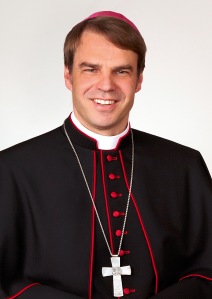 The most extensive explanation for signing the letter comes from Bishop Stefan Oster of Passau. In an article published in the diocesan magazine and on his personal website, he emphasises that the debates within the bishops’ conference have always been fraternal and respectful. He then goes on to explain his reason for signing the letter to Rome.
The most extensive explanation for signing the letter comes from Bishop Stefan Oster of Passau. In an article published in the diocesan magazine and on his personal website, he emphasises that the debates within the bishops’ conference have always been fraternal and respectful. He then goes on to explain his reason for signing the letter to Rome.
“The Eucharist is so central to us Catholics, that it expresses the basis of our entire understanding of faith and church. Someone who is able to say “Amen” at the end of the Eucharistic Prayer, says yes to the communion with the Pope and the bishops and with the saints that it implies. He says yes to the special priesthood, the prayer to the mother of the Lord and for the dead – to name just those points which distinguish us, for example in the understanding of what a church is, from our Evangelical brothers. In essence our being Church is expressed in its most dense and concrete way in the Eucharist.”
The proposal from the German bishops includes the idea that a non-Catholic with a strong desire to receive the Eucharist, and after confirming the Catholic understanding of it, can do so. They claim that this is one of the exceptions in which a non-Catholic can receive, normally in an emergency and danger of death. But Bishop Oster rightly states that a person with the desire to receive with his or her spouse is not automatically in danger of death and “has time and opportunity to enter into the Church, as he or she already shares the same understanding of Church and Eucharist.” The bishop wants to know if this desire is indeed a serious necessity or even danger which would allow a non-Catholic to receive Communion.
The proposal also creates some strange ecumenical discrepancies:
“At the same time the proposal states that the Catholic spouse can not join in the Evangelical Last Supper, since the understanding of this Last Supper is so clearly different. This means that, according to the logic of the proposal the Evangelical partner can receive both Eucharist and Last Supper, but the Catholic can not. The Evangelical partner is trusted to somehow uphold both understandings of faith, but not the Catholic, since they do not go together. I think it is very difficult to communicate this!”
Bishop Oster also no romantic notions of how such a change would be generally received by the faithful:
“Experience with past regulations show us that what are depicted as singular cases here, will be perceived by the general public as a broad permission, in the sense of: “Now the others can finally come to Communion with us.”
The first reactions support this reading, the bishop says, and that may lead to a trivialisation of the Eucharist. “After all, we rightly call the Eucharist “the most holy”, and how we treat it is, in my opinion, very important.”
The bishop of Passau ends his article with a second reminder that, despite what some media claim, there is no schism among the German bishops, and nor will there be.
“I am fully convinced that the bishops who think differently also want what is best for the Church and ecumenism. For us signatories the unity of the bishops’ conference, as well as progress in ecumenism, is also important. But we wonder if the path chosen can be taken in this way – and very much want to receive a deeper explanation.”
EDIT (19-4): The German Bishops’ Conference released a statement today in which it declares that any reports about a decision against the pastoral document from the bishops about intercommunion are false. The Holy Father has, however, issued an invitation to Cardinal Reinhard Marx, president of the conference, to discuss the issue in Rome. Cardinal Marx has gladly welcomed this invitation. Who will take part in this discussion remains to be seen.
Photo credit: [1] Raimond Spekking / CC BY-SA 4.0 via Wikimedia Commons


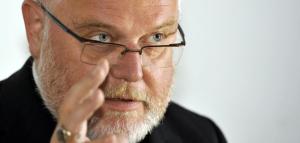 Cardinal Reinhard Marx, president of the German Bishops’ Conference, responded with a letter to all German bishops – a decision motivated by the fact that the letter concerns a decision made by the entire conference and was sent to the Holy See and the Apostolic Nuncio. In his response, he emphasises that no decision has been made to allow non-Catholics to receive Communion, but that there is a working document which may still be amended or changed. The cardinal also reminds the authors that bishops’ conferences and individual bishops have the right, according to canon law, to determine when Holy Communion can be given licitly to non-Catholics.
Cardinal Reinhard Marx, president of the German Bishops’ Conference, responded with a letter to all German bishops – a decision motivated by the fact that the letter concerns a decision made by the entire conference and was sent to the Holy See and the Apostolic Nuncio. In his response, he emphasises that no decision has been made to allow non-Catholics to receive Communion, but that there is a working document which may still be amended or changed. The cardinal also reminds the authors that bishops’ conferences and individual bishops have the right, according to canon law, to determine when Holy Communion can be given licitly to non-Catholics. Deacon Jesús Mauricio Meneses Santiago (pictured, fourth from the left) is Colombian. He came to the Archdiocese of Utrecht as one of four religious, wanting to do something in return for the Dutch missionaries who had come to Colombia in the past. His three fellow religious returned home over the years, but Deacon Meneses Santiago decided to stay. He says: “That was not an easy choice. But I wanted to remain true to my calling. And I am happy. The Netherlands have stolen my heart and I feel at home here. My vocation is God’s initiative, I am here for a reason. I will continue this mission that God has entrusted me with.”
Deacon Jesús Mauricio Meneses Santiago (pictured, fourth from the left) is Colombian. He came to the Archdiocese of Utrecht as one of four religious, wanting to do something in return for the Dutch missionaries who had come to Colombia in the past. His three fellow religious returned home over the years, but Deacon Meneses Santiago decided to stay. He says: “That was not an easy choice. But I wanted to remain true to my calling. And I am happy. The Netherlands have stolen my heart and I feel at home here. My vocation is God’s initiative, I am here for a reason. I will continue this mission that God has entrusted me with.”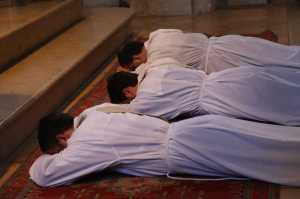 Diocese of Eichstätt, ordained by Bishop Gregor Maria Hanke
Diocese of Eichstätt, ordained by Bishop Gregor Maria Hanke Archdiocese of Paderborn, ordained by Bishop Manfred Grothe
Archdiocese of Paderborn, ordained by Bishop Manfred Grothe Big day in Berlin today, as Archbishop Heiner Koch is installed as its third archbishop and tenth bishop overall. The installation, starting at 11 o’clock local time, will be streamed live via
Big day in Berlin today, as Archbishop Heiner Koch is installed as its third archbishop and tenth bishop overall. The installation, starting at 11 o’clock local time, will be streamed live via 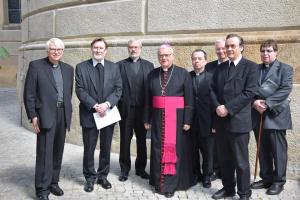 Following the appointment of Archbishop Heiner Koch (pictured at left with Berlin’s cathedral chapter) to Berlin, the other bishops of eastern Germany have expressed concern at the trend that seems to be developing, a tendency for bishops in that part of the country to be reassigned within a few years after being made ordinaries there. And they have a point.
Following the appointment of Archbishop Heiner Koch (pictured at left with Berlin’s cathedral chapter) to Berlin, the other bishops of eastern Germany have expressed concern at the trend that seems to be developing, a tendency for bishops in that part of the country to be reassigned within a few years after being made ordinaries there. And they have a point.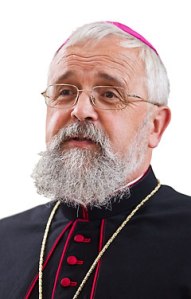 In fact, the eastern German episcopate as a whole is young. Only Magdeburg’s Gerhard Feige (pictured) has a decade as bishop behind him, and the next senior is Görlitz’s Wolfgang Ipolt, ordinary for a mere four years.
In fact, the eastern German episcopate as a whole is young. Only Magdeburg’s Gerhard Feige (pictured) has a decade as bishop behind him, and the next senior is Görlitz’s Wolfgang Ipolt, ordinary for a mere four years. Just to show that not all German bishops intent on upending all Catholic teaching, as some media would have us believe, here is a translation of a letter sent by five bishops to the bishop of Passau, msgr. Stefan Oster, after the latter criticised the call from the Central Committee of German Catholics (the ZdK) to start blessing same-sex relationships as well as new relationships of divorced Catholics. The ZdK is a lay movement recognised by the Bishops’ Conference to promote the lay apostolate in the Church. Bishop Oster criticised their proposal by pointing out the Biblical basis of marriage and the understanding of Biblical revelation. He also pointed out that the “use” of Pope Francis to support the calls for change has no basis in reality.
Just to show that not all German bishops intent on upending all Catholic teaching, as some media would have us believe, here is a translation of a letter sent by five bishops to the bishop of Passau, msgr. Stefan Oster, after the latter criticised the call from the Central Committee of German Catholics (the ZdK) to start blessing same-sex relationships as well as new relationships of divorced Catholics. The ZdK is a lay movement recognised by the Bishops’ Conference to promote the lay apostolate in the Church. Bishop Oster criticised their proposal by pointing out the Biblical basis of marriage and the understanding of Biblical revelation. He also pointed out that the “use” of Pope Francis to support the calls for change has no basis in reality. Today the German Diocese of Görlitz bade farewell to its first bishop, Rudolf Müller, who had passed away on Christmas Day at the age of 81. A priest since 1955. Bishop Müller was appointed to head the Apostolic Administration of Görlitz in 1987. He became the first ordinary when Görlitz became a diocese in 1994. In 2006 he retired.
Today the German Diocese of Görlitz bade farewell to its first bishop, Rudolf Müller, who had passed away on Christmas Day at the age of 81. A priest since 1955. Bishop Müller was appointed to head the Apostolic Administration of Görlitz in 1987. He became the first ordinary when Görlitz became a diocese in 1994. In 2006 he retired.
 With yesterday’s retirement of Bishop Joachim Reinelt the Berlin Church Province is close to completing a significant generational shift. For the first time since the province, which consists of the Metropolitan Archdiocese of Berlin and the Dioceses of Görlitz and Dresden-Meiβen, was established in its modern form in 1994*, a new generation of bishops is set to take over.
With yesterday’s retirement of Bishop Joachim Reinelt the Berlin Church Province is close to completing a significant generational shift. For the first time since the province, which consists of the Metropolitan Archdiocese of Berlin and the Dioceses of Görlitz and Dresden-Meiβen, was established in its modern form in 1994*, a new generation of bishops is set to take over.


